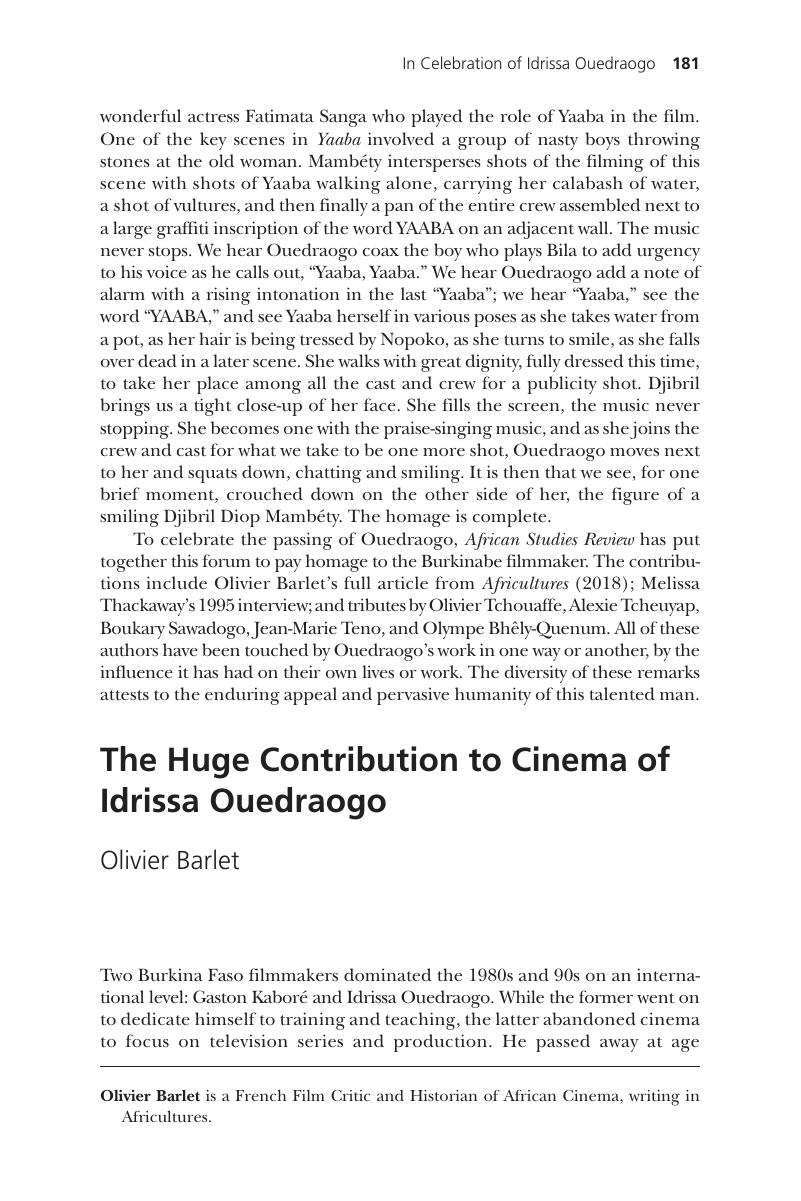Article contents
The Huge Contribution to Cinema of Idrissa Ouedraogo
Published online by Cambridge University Press: 29 August 2018
Abstract

- Type
- Forum in Celebration of Idrissa Ouedraogo
- Information
- Copyright
- Copyright © African Studies Association 2018
References
Notes
1. These films were already on the way to being fictionalized documentaries. It was at the point when he realized that, given its current resources, cinema would never reach rural populations, Idrissa Ouedraogo turned to purely fictional filmmaking.
2. “Interview with Idrissa Ouedraogo,” Cahiers du Cinéma, 423, September 1989, p. 8.
3. Before this, black African films were almost totally absent from the screens of Cannes. The panel of judges of the “Un Certain Regard” prize had shortlisted Fad’jal (Safi Faye, Senegal) in 1979 and a Senegalese short, Le Certificat d’indigence (Moussa Yoro Bathily) in 1983.
4. Interview with Idrissa Ouedraogo, Paris, 1995.
5. Manthia Diawara, African Cinema, politics and culture, Indiana University Press 1992, pp. 162, 164.
6. “Pourquoi juge-t-on les gens? Entretien avec Idrissa Ouedraogo,” Cahiers du Cinéma, 423, September 1989, p. 8.
7. N. F. Ukadike, Black African Cinema, University of California Press 1994, pp. 279, 282.
8. Sony Labou Tansi, Les sept solitudes de Lorsa Lopes, Le Seuil, 1985, p. 11.
9. Sony Labou Tansi, Les sept solitudes de Lorsa Lopes, Le Seuil, 1985, p. 11.
10. To quote the title of the famous book by the Cameroonian writer Jean-Marc Ela, The African Cry, trans. Robert R. Barr, Orbis, London, 1986.
11. This might be seen as a modern version of David Diop’s lines from “Africa”:
“Africa my Africa,
…
… your blood flows in my veins
Your beautiful black blood that irrigates the fields.”
(Gerald Moore and Ulli Beier (eds.), Modern Poetry from Africa, Penguin Books, Harmondsworth, 1963, p. 58).
12. Interviews with Idrissa Ouedraogo, Ouagadougou and Paris, 1995.
13. Francis Bebey, the famous writer, poet and composer/performer made a brilliant foray into cinema in 1974 with Sonate en bien majeur, the moral trials and tribulations of an immigrant in Paris.
14. Jacques Samé, “Entretien avec Idrissa Ouedraogo,” Le Film Africain, 22, November 1995, p. 8.
- 1
- Cited by


